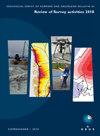Transport of nitrate-containing groundwater to coastal areas through buried tunnel valleys, Denmark
IF 1.3
4区 地球科学
Q1 GEOLOGY
引用次数: 0
Abstract
Nitrogen impact on the aquatic environment, including coastal areas, is too high in many countries worldwide, particularly in areas with intensive agriculture. Efficient mitigation initiatives demand that important pathways and the fate of nitrate in the hydrological cycle are known. In this study, we focus on groundwater nitrate contamination in two near-shore catchment areas in north-west Denmark. Groundwater in the area is mainly located in buried tunnel valleys, which are subsurface structures eroded by meltwater during Pleistocene glaciations in former glaciated areas. Groundwater samples from the aquifers inside the buried valleys reveal the presence of up to 120 mg/l nitrate down to 10 m below sea level and about 1 km down from the stream outlet towards the coast. We interpret the complex tunnel-valley infill to be responsible for the spatial heterogeneity of the groundwater geochemistry, where sandy geological windows create localised hydraulic pathways and complex redox structures. Groundwater and stream water chemistry in the study area clearly demonstrate the role of groundwater in nitrate transport within the catchment as well as the direct pathway to the coast bypassing the stream and riverine systems. Our results show that the buried tunnel valleys potentially contribute to submarine groundwater discharge and therefore could be responsible for a hitherto unaccounted input of nitrogen to the marine environment.含硝酸盐的地下水通过埋藏的隧道河谷向沿海地区的迁移,丹麦
在世界许多国家,尤其是在集约农业地区,氮对水生环境(包括沿海地区)的影响过大。要采取有效的减缓措施,就必须了解硝酸盐在水文循环中的重要路径和归宿。在这项研究中,我们重点关注丹麦西北部两个近岸集水区的地下水硝酸盐污染情况。该地区的地下水主要位于埋藏的隧道河谷中,这些隧道河谷是前冰川地区更新世冰川时期融水侵蚀而成的地下结构。从埋藏在山谷内的含水层采集的地下水样本显示,在海平面以下 10 米处,以及从溪流出口向海岸延伸约 1 公里处,硝酸盐含量高达 120 毫克/升。我们认为,复杂的隧道-溪谷填充是造成地下水地球化学空间异质性的原因,砂质地质窗口形成了局部的水力通道和复杂的氧化还原结构。研究区域的地下水和溪流水化学清楚地表明了地下水在集水区内硝酸盐迁移中的作用,以及绕过溪流和河流系统直接通往海岸的路径。我们的研究结果表明,埋藏在地下的隧道河谷有可能造成海底地下水的排放,因此可能是迄今为止未被计算的向海洋环境输入氮的原因。
本文章由计算机程序翻译,如有差异,请以英文原文为准。
求助全文
约1分钟内获得全文
求助全文

 求助内容:
求助内容: 应助结果提醒方式:
应助结果提醒方式:


